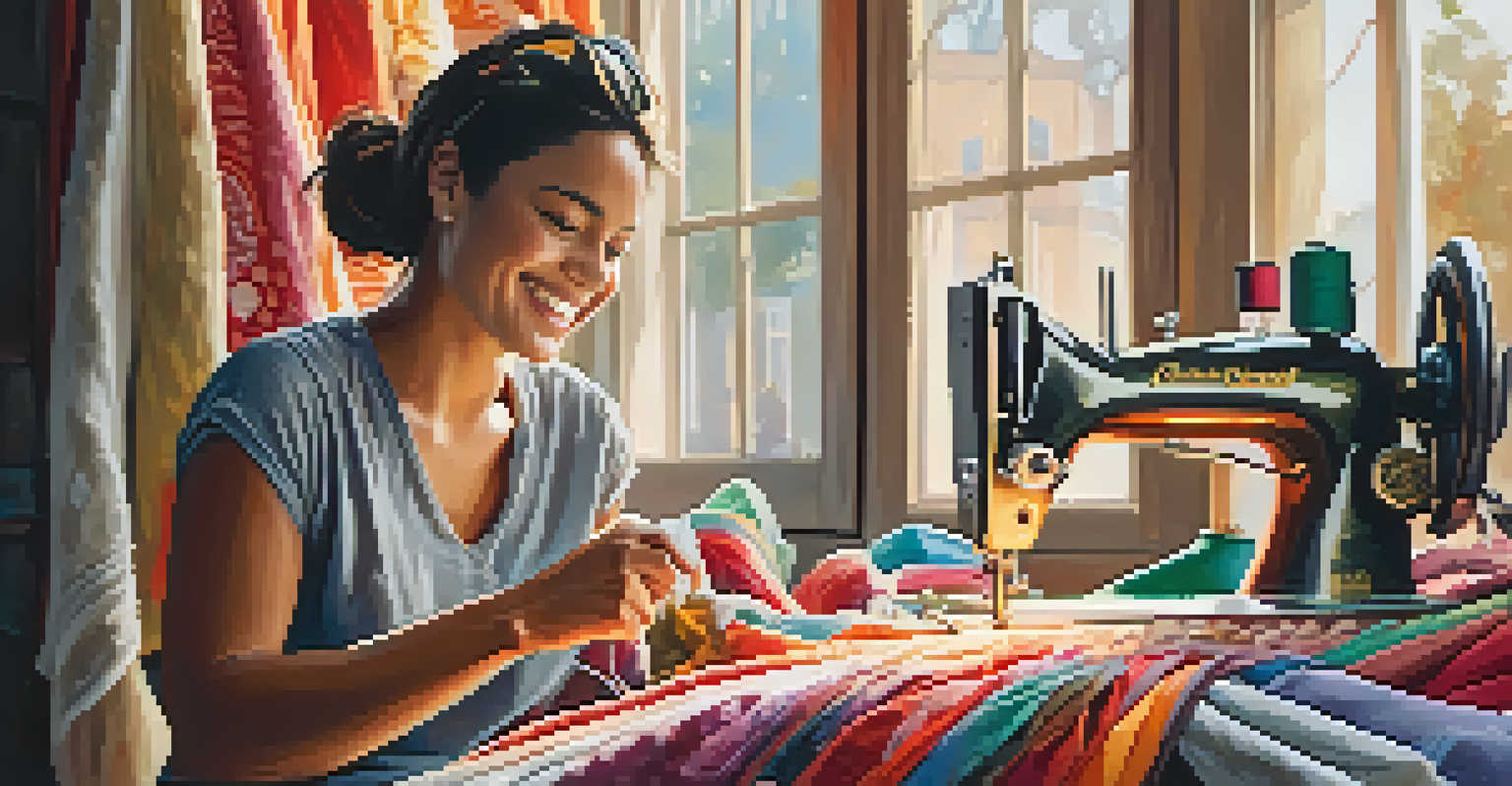Empowering Women Through Sustainable Fashion Initiatives

Understanding Sustainable Fashion and Its Importance
Sustainable fashion refers to clothing that is designed, manufactured, and consumed in a way that is environmentally friendly and socially responsible. It emphasizes the use of eco-friendly materials and ethical labor practices. This approach not only helps reduce the negative impact on the planet but also promotes fair wages and safe working conditions for workers, especially women.
Fashion is the armor to survive the reality of everyday life.
Moreover, as the fashion industry is one of the largest polluters globally, shifting towards sustainable practices is crucial for preserving our environment. By prioritizing sustainability, we can protect natural resources and foster a healthier planet for future generations. This is particularly empowering for women, who often bear the brunt of environmental degradation and economic instability.
Ultimately, sustainable fashion is about more than just style; it's a movement that seeks to create a more equitable world. By supporting initiatives that empower women, we take steps toward a more inclusive and sustainable future, where everyone can thrive.
The Role of Women in the Fashion Industry
Women have historically played a vital role in the fashion industry, from designers to seamstresses. However, many face challenges such as low pay, poor working conditions, and a lack of opportunities for advancement. Understanding these issues is crucial to advocating for change and promoting gender equality within the industry.

By highlighting women's contributions and struggles, we can better appreciate their resilience and creativity. Many women are now stepping into leadership roles in sustainable fashion initiatives, driving innovative solutions to age-old problems. This shift not only empowers women but also encourages a new generation of female entrepreneurs.
Empowering Women in Fashion
Sustainable fashion initiatives are increasingly led by women, promoting both their empowerment and community strength.
As we celebrate women’s achievements in fashion, it's essential to recognize the systemic barriers they face. Empowering women through education and resources can help dismantle these obstacles, paving the way for a more equitable industry.
Successful Sustainable Fashion Initiatives
There are numerous sustainable fashion initiatives making waves around the globe, many of which are led by women. For example, organizations like Women for Women International offer training and resources to female artisans in war-torn regions, enabling them to create and sell their clothing sustainably. These initiatives not only uplift individual women but also strengthen communities.
Sustainability is no longer about doing less harm. It's about doing more good.
Another notable example is the brand Reformation, which focuses on eco-friendly practices while promoting women’s empowerment through fair labor policies. They provide women with opportunities for career advancement and support female-led projects, proving that sustainability and empowerment can go hand in hand.
These examples illustrate how sustainable fashion initiatives can create a positive ripple effect, benefiting not just women but entire communities. As more brands and organizations embrace these practices, the potential for widespread change becomes even greater.
Education and Training for Women in Fashion
Education plays a pivotal role in empowering women within the sustainable fashion sector. By providing training programs that focus on design, manufacturing, and business skills, we can equip women with the knowledge they need to succeed. This education can take various forms, from workshops to online courses, making it accessible to a wider audience.
Organizations like Fashion Revolution advocate for transparency in the fashion industry and offer resources that help women learn about sustainable practices. By fostering a culture of learning and innovation, these programs enable women to become leaders in their communities and beyond.
Consumer Impact on Sustainability
Consumer choices significantly influence women's empowerment by supporting brands with ethical practices and fair labor.
Moreover, education encourages women to express their creativity and develop their unique styles, contributing to a diverse and rich fashion landscape. When women are empowered through knowledge, they are more likely to pursue their passions and make a meaningful impact in the industry.
The Impact of Consumer Choices on Women
As consumers, our choices can significantly impact women's empowerment within the fashion industry. By supporting sustainable brands that prioritize ethical practices, we directly contribute to fair wages and safe working conditions for female workers. This simple act of choosing wisely can create substantial change.
Moreover, raising awareness about the importance of sustainability in fashion can inspire others to make conscious choices as well. Sharing stories of women who create sustainable fashion can help shift perceptions and encourage more people to consider the ethical implications of their purchases.
Ultimately, when we choose to support brands that align with our values, we become part of a larger movement. Our collective efforts can lead to an industry that values not only profit but also people and the planet.
Challenges Facing Women in Sustainable Fashion
While there are many empowering initiatives, challenges remain for women in sustainable fashion. Access to funding and resources can be limited, making it difficult for female entrepreneurs to establish their businesses. Additionally, the lack of representation in leadership roles can hinder progress toward gender equality.
Another challenge is the ongoing struggle against fast fashion, which often exploits women in developing countries. This industry promotes unsustainable practices and low wages, creating a cycle of poverty that is difficult to break. Women in fashion must advocate for more sustainable alternatives that prioritize ethical treatment and fair compensation.
Education Fuels Fashion Change
Education and training programs are essential for equipping women with the skills needed to thrive in sustainable fashion.
Addressing these challenges requires a concerted effort from all stakeholders, including consumers, brands, and policymakers. By working together, we can create an environment where women thrive and the fashion industry evolves toward sustainability.
The Future of Women and Sustainable Fashion
The future of women in sustainable fashion looks promising as more individuals and organizations recognize the importance of empowerment and sustainability. With a growing demand for ethical practices, women have the opportunity to lead initiatives that reshape the industry. This shift can foster innovation and creativity, paving the way for a more inclusive fashion landscape.
As consumers become increasingly aware of their impact, they will likely support brands that prioritize women's empowerment and sustainability. This trend can lead to a greater investment in women-led initiatives, creating a positive feedback loop that benefits both the industry and society as a whole.

Ultimately, the journey toward empowering women through sustainable fashion is ongoing. With continued advocacy, education, and support, we can create a vibrant future where women play a central role in shaping the fashion world.